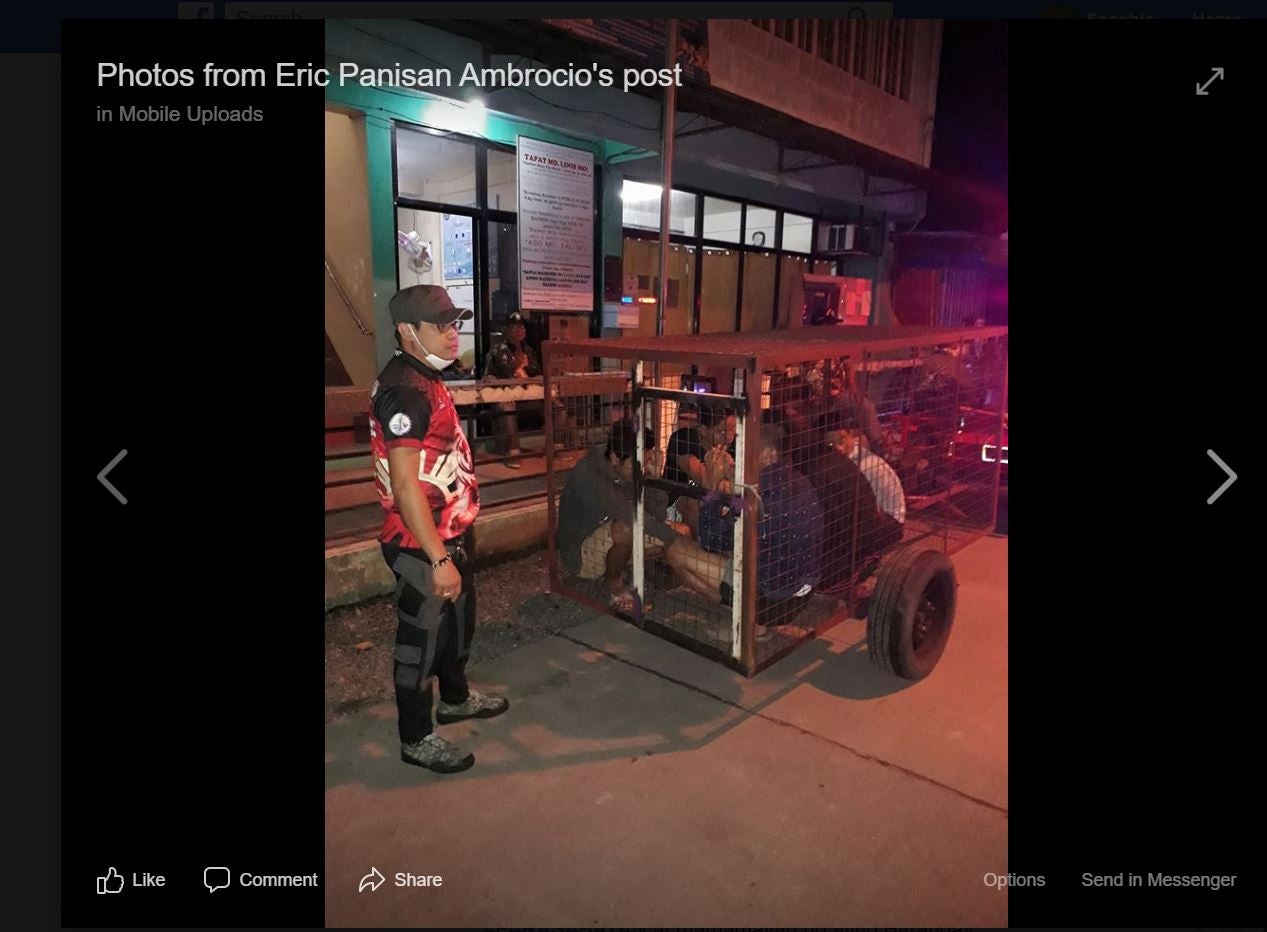Philippines: Curfew Violators Abused

Expand A screenshot of an officer with five youths locked inside a dog cage after breaking curfew in Laguna province, the Philippines on March 20, 2020. © 2020 Facebook (Manila) – Philippine authorities should respect the basic rights of people detained for violating the government’s COVID-19 regulations, Human Rights Watch said today. Police and local officials have confined those arrested to dog cages and forced them to sit in the midday sun as punishment, among other abuses. A screenshot of an officer with five youths locked inside a dog cage after breaking curfew in Laguna province, the Philippines on March 20, 2020. Reports of abuse against detainees should be promptly investigated and those responsible should be appropriately disciplined or prosecuted, Human Rights Watch said. “Police and local officials should respect the rights of those they arrest for violating curfew and other public health regulations, which can be done while still allowing the Philippines government to take appropriate measures to combat COVID-19,” said Phil Robertson, deputy Asia director. “Any mistreatment should be immediately investigated, and the authorities responsible held accountable.” Since President Rodrigo Duterte put the main Philippine island of Luzon on lockdown on March 16, 2020, police have arrested hundreds of people in the capital, Manila, and other parts of the country. Most of the arrests are for violating curfew but some are for violating “social distancing” and quarantine regulations. Other cities and provinces enforced their own lockdowns following Duterte’s action, effectively shutting down the country. Local officials in Santa Cruz town, in Laguna province just south of Manila, admitted locking up five youths inside a dog cage on March 20.
The officials sought to justify their action by saying the youths had violated the curfew and been verbally abusive, and said that they had also been rounding up stray dogs that night. Officials forced curfew violators in Parañaque, a city within Metro Manila, to sit in the intense midday sun after their arrest.
The officials claimed they only put them there temporarily because they had no place to hold them. In Bulacan province just north of Manila, police killed a man after he allegedly avoided a checkpoint.
The police claim that the man had shot at pursuing police officers.
The Department of Justice determined authorities can arrest people even if they “do not seriously resist” police action to abide by the curfew and other restrictions.
The national Commission on Human Rights responded that violations “should not be automatically meted with arrest” and added that such arrests could lead to additional human rights abuses.
The Philippine government should urgently take steps to ensure further mistreatment does not occur as the authorities tighten their anti-COVID-19 measures over the coming days, Human Rights Watch. On March 24, Duterte signed a law granting him emergency powers to deal with the response to contagion.
The law places the entire country under a “state of emergency” for at least three months.
The law contains a provision that penalizes, yet does not define, the creation and propagation of “false information,” opening the door to potential misuse. Duterte has also announced a COVID-19 “national action plan” to be led by the military and the police. Arresting people for curfew violations to enforce social distancing related to COVID-19 is counter-productive if police place detainees in crowded detention facilities where the virus could spread easily. For example, the government press agency reported that police in Bacolod city, on Negros, arrested 728 persons for violating the curfew between March 15-21, and detained them overnight in police lock-ups before releasing them the next day. Human Rights Watch released a document on March 19 outlining the human rights dimensions of COVID-19. Among other recommendations, it urges governments to ensure that quarantines, lockdowns, and travel bans – including curfew – adhere to human rights norms. It urges authorities to protect people in custody and to ensure that the right to freedom of expression is upheld. As of March 24, the Philippines recorded 552 cases of coronavirus infections and 35 deaths. “While the Philippines government needs to protect the health and welfare of the people, any interventions must be in line with international human rights standard, including the prohibition against cruel, inhuman, and degrading treatment of people in custody,” Roberts.
Read the full article at the original website
References:
- https://www.hrw.org/asia/philippines
- https://www.hrw.org/about/people/phil-robertson
- https://www.mindanews.com/top-stories/2020/03/32-foreigners-locals-in-siargao-arrested-for-violating-quarantine-curfew/
- https://newsinfo.inquirer.net/1247669/759-curfew-violators-arrested-in-manila-amid-community-quarantine
- https://newsinfo.inquirer.net/1247740/eastern-visayas-pnp-list-249-curfew-violators-arrested
- https://newsinfo.inquirer.net/1247729/woman-arrested-for-refusing-to-keep-her-children-at-home-during-covid-19-quarantine
- https://scontent.fcgy1-1.fna.fbcdn.net/v/t1.0-9/p720x720/90053061_1306378912883032_6498790048656261120_o.jpg?_nc_cat=105&_nc_sid=110474&_nc_eui2=AeEOewfJXzT85D_xV93aHPmVwKY08qsOmjeOH3xmpcBhYqZ6hCdZp1Tq86VsxPixn6WrMVmFqTCrJCgDz2laIEkr1R50ol3-6SY5ZVbDtvAmpQ&_nc_oc=AQkzRDMI42Obdw8l3X83KaOHqZynVcqTr1LSaZ_Ru-0oMoQ86T7PtsL4XNjBVt582dM&_nc_ht=scontent.fcgy1-1.fna&_nc_tp=6&oh=98000f884137c68892d2e2aaf2fb5a99&oe=5EA17F6D
- https://www.philstar.com/headlines/2020/03/25/2003270/paraaque-curfew-violators-tortured
- https://www.philstar.com/headlines/2020/03/25/2003278/bulacan-checkpoint-evader-killed-shooutout
- https://www.gmanetwork.com/news/news/nation/730131/violators-of-quarantine-can-be-arrested-even-without-serious-resistance-doj/story/
- https://www.cnnphilippines.com/news/2020/3/20/chr-covid-19-quarantine-arrests.html
- https://www.rappler.com/nation/255718-duterte-signs-law-granting-special-powers-coronavirus-outbreak
- https://www.rappler.com/nation/255753-duterte-special-powers-bill-coronavirus-fines-fake-news
- https://www.rappler.com/nation/255763-government-implement-national-action-plan-coronavirus-dnd-lead
- https://www.pna.gov.ph/articles/1097514
- https://www.hrw.org/news/2020/03/19/human-rights-dimensions-covid-19-response
- https://www.hrw.org/news/2020/03/19/human-rights-dimensions-covid-19-response#_Toc35446580
- https://www.hrw.org/news/2020/03/19/human-rights-dimensions-covid-19-response#_Toc35446581
- https://www.hrw.org/news/2020/03/19/human-rights-dimensions-covid-19-response#_Toc35446579
- https://www.rappler.com/nation/255656-coronavirus-philippines-cases-march-24-2020
